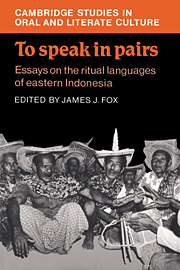Book contents
- Frontmatter
- Contents
- Illustrations
- The contributors
- Acknowledgements
- Introduction
- 1 Etiquette in Kodi spirit communication: the lips told to pronounce, the mouths told to speak
- 2 Method in the metaphor: the ritual language of Wanukaka
- 3 Li'i marapu: speech and ritual among the Wewewa of west Sumba
- 4 The Pattern of Prayer in Weyéwa
- 5 Fashioned speech, full communication: aspects of eastern Sumbanese ritual language
- 6 Manu Kama's road, Tepa Nilu's path: theme, narrative, and formula in Rotinese ritual language
- 7 The case of the purloined statues: the power of words among the Lionese
- 8 The journey of the bridegroom: idioms of marriage among the Endenese
- 9 A quest for the source: the ontogenesis of a creation myth of the Ata Tana Ai
- 10 The Tree of Desire: A Toraja ritual poem
- Notes
- References
- Index
6 - Manu Kama's road, Tepa Nilu's path: theme, narrative, and formula in Rotinese ritual language
Published online by Cambridge University Press: 19 October 2009
- Frontmatter
- Contents
- Illustrations
- The contributors
- Acknowledgements
- Introduction
- 1 Etiquette in Kodi spirit communication: the lips told to pronounce, the mouths told to speak
- 2 Method in the metaphor: the ritual language of Wanukaka
- 3 Li'i marapu: speech and ritual among the Wewewa of west Sumba
- 4 The Pattern of Prayer in Weyéwa
- 5 Fashioned speech, full communication: aspects of eastern Sumbanese ritual language
- 6 Manu Kama's road, Tepa Nilu's path: theme, narrative, and formula in Rotinese ritual language
- 7 The case of the purloined statues: the power of words among the Lionese
- 8 The journey of the bridegroom: idioms of marriage among the Endenese
- 9 A quest for the source: the ontogenesis of a creation myth of the Ata Tana Ai
- 10 The Tree of Desire: A Toraja ritual poem
- Notes
- References
- Index
Summary
This paper provides a reading of the translation of a single text in Rotinese ritual language. I have chosen this text for a variety of reasons, but, in particular, because it offers a glimpse of the world created through the cultural imagination of the Rotinese. The underlying assumptions, conventional expressions, and complex philosophy of life that give coherence to this poetic world cannot all be explicated in this paper. My intention is simply to examine the text selectively at various levels from its metaphysical allegory to the minutiae of the formulae embodied in it. As such, this reading may provide something of an introduction to the possibilities of this form of poetry.
Introduction to the historical text
In 1911 the renowned Dutch linguist, J.C.G. Jonker, published the text of a long Rotinese ritual chant. He added this single chant to his collection of Rotinese texts as an ‘example of poetic style’ which he recognised was characterised by ‘sustained parallelism’. But instead of translating the chant, which he implied was ‘obscure’, he merely provided a series of notes to it with a translation of the ordinary language paraphrase that accompanied the text (Jonker 1911:97–102, 130–135). In 1913 Jonker published another collection of texts in a variety of Rotinese dialects and, in 1915, his massive Rotinese grammar, but he never again gave further consideration to the chant, and so it has remained the only untranslated portion of his vast corpus of Rotinese material.
- Type
- Chapter
- Information
- To Speak in PairsEssays on the Ritual Languages of eastern Indonesia, pp. 161 - 201Publisher: Cambridge University PressPrint publication year: 1988
- 5
- Cited by



